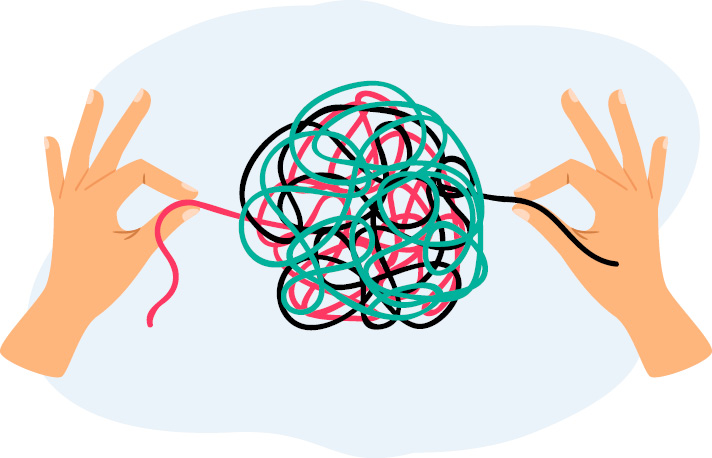Unfavourable events and experiences in life, difficulties in daily life, severe diseases, accidents, loss of the loved ones… These are all situations that we have all encountered or will encounter in our lifetime. Life is full of ups and downs. Every person reacts differently to the events, the problems and difficulties encountered in their daily life. A person’s reaction to a situation and that of another person are different from one another.
Persons use their own respective skills and strengths to deal with problems and difficulties. The things that psychologically strengthens us in the face of these difficulties improve our resilience.
Psychological resilience is the effort persons make in order to deal with the problems and difficulties encountered or to be encountered in the course of their lives, as well as the capacity to reinforce personal strengths in the face of such effort.
Psychological resilience does not eliminate the stress, difficulties or problems experienced by people. However, it gives people the strength to deal directly with problems, overcome difficulties and move on with life. Resilience reduces the negative impacts of stressful situations and makes it easier for us to adapt to our life and the conditions surrounding us.

We may experience certain situations that make it difficult to adapt to our life and our environment. These are defined as risk factors:
Risk Factors of Psychological Resilience:
| Environmental Risk Factors | Family-Related Risk Factors | Personal Risk Factors |
| • Financial difficulties and poverty • Scarcity of resources • Inability to meet the need for sheltering • Social violence and family tragedies • Social traumas such as war and natural disasters •Being in an environment where the level of social tension is high and violence is encountered. | • Severe diseases in the family • Violence in relationships between parents or in other relationships in the family * Use of alcohol or substances at home * Death or loss in the family • Domestic neglect and sexual abuse • Being a mother at a young age | • Premature birth • Adverse life experiences • Chronic diseases • Inadequacy of the person’s ability to overcome problems • Having aggressive personality traits • Person experiencing problems in adaptation to the social environment |
Resilience can be improved with effort and practice.
The situations that improve psychological resilience are also protective factors.
Protective factors enable us to prevent the emergence of any risk and threat before they occur, and to reduce any impact in the event that they do occur. This depends on development of the individual’s adaptive skills. Prevention of risks and threats helps reduce the impact of the problems experienced. This allows the individual to feel better and stronger. The individuals become more resilient in the face of difficulties
The protective factors can be divided into three categories: environmental, family-related and personal.
| Environmental Protective Factors | Family-Related Protective Factors | Personal Protective Factors |
| Involvement in a social environment Support from peers/friends Attendance in school and preparation for the future for children A positive and close relationship with a trusted adult outside the family |
|
|
Each individual reacts differently to the problems and troubles encountered. While some people can overcome their problems very well, others may not overcome the same conditions and experience mental health problems. Resilience is the individual’s ability to endure against all conditions and have the strength to fight.
Psychological resilience has been defined as personality traits that support individuals’ positive adaptation to, and ability to make efforts in, their environment and life, even when they face difficulties and are under stress.
The personal traits that play a fundamental role in the formation of psychological resilience are as follows:
- “Proportionality”, which refers to the balanced and harmonious progression of life and experiences, meaning ‘balance’;
- “Decisiveness”, which refers to the will to rebuild and continue life;
- “Self-Confidence”, which refers to the belief in one’s self and one’s own abilities;
- “Sense-Making Ability”, which refers to believing that the life has a purpose;
- “Tolerance and Acceptance”, which is the understanding that the path of life progresses in its unique way for everyone.
The ways and methods that can be followed in order to build and improve psychological resilience may be as follows:
Improving our sense of meaning and commitment:
- This is a sense of purpose and meaning created by the individual’s active participation in daily events. Improving the sense of commitment helps increase one’s sense of strength and resilience.
- Attributing meaning to one’s family, environment, relationships with people, beliefs and values, and owning these beliefs and values will improve the meaning they attribute to life.
- Individuals with high commitment make their lives meaningful by being interested in the events and people around them, instead of being excluded by being under stress
Strengthening our sense of control:
- People who believe that they can direct the events themselves and contribute to recovery when faced with difficulties can cope with difficulties more easily.
- People can have the power to change the ideas and behaviours they encounter in their lives. When persons believe that they can change the results in a positive way instead of giving up when faced with a challenge, they start to exert efforts for their life in a positive manner.

A sense of strength and challenge against life and events:
- We need to realize that change is a must-have in life, rather than a fixed belief that it will bring unfavourable results. Adapting to life becomes easier when we believe that change can contribute to the progress of life.
For this purpose, here are certain methods that will strengthen our psychological resilience in our daily lives:
- Communicating with someone you love and trust will increase your sense of confidence and thus will help improve your psychological resilience.
- It will be useful for you to try to act by thinking instead of giving sudden reactions in situations of difficulty and stress. The way to make the right decision is to give yourself time to understand the issue and resolve it properly.
- Learning to calm down is very important! Everyone has different ways of calming themselves. It will be useful to try to know yourself and to be aware of the things that will be good for you.
- Needs such as nutrition, shelter and sleep are basic needs. Everybody needs to recognize these basic needs and develop ways to meet them properly. You must accept that you have basic needs, and you should not put them off.
- Allow yourself to feel and express your emotions. There are various ways to express your feelings. Sometimes writing, speaking, or painting can make you feel good.
- Remember the methods you used to cope with difficulties in the past. You may remember a time when you felt psychologically resilient.
- When you’re feeling under pressure, turn on your favourite relaxing music and mentally take yourself to a place where you feel safe.
- Try to control your breathing by relaxing your body and muscles. Breathing exercises can be helpful. Take a deep breath in through your nose, hold for a few seconds, and breathe out through your mouth as slowly as you can.
- Increasing your physical strength by going for a walk, exercising and moving also increases your psychological resilience.
- You may try to remember that you have the right to protect yourself from situations and people that you realize are harming you and that you can decide to stay away from these situations and people if necessary.
- Learning to ask for help when needed is not a weakness. On the contrary, it is part of the efforts to find solutions. It will improve your resilience.
- Take care of yourselves!

